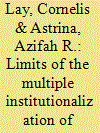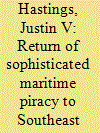|
|
|
Sort Order |
|
|
|
Items / Page
|
|
|
|
|
|
|
| Srl | Item |
| 1 |
ID:
170997


|
|
|
|
|
| Summary/Abstract |
Why do some national governments in Asia and the Pacific protect labour rights better in practice than others? This article argues that labour rights are better protected in Asia-Pacific countries where civil society organizations participate more intensively in the government's policy-making process. It goes beyond treating regime type in the aggregate and demonstrates that the associational dimension of regime type plays a critical role in shaping government protection of labour rights in Asia and the Pacific. Multivariate longitudinal analyses of all 30 Asia-Pacific countries from 1981 to 2011 find robust support for the theory, using new data on civil society participation, and controlling for electoral democracy, trade openness, economic development, unobserved country-level heterogeneity, and other factors.
|
|
|
|
|
|
|
|
|
|
|
|
|
|
|
|
| 2 |
ID:
170996


|
|
|
|
|
| Summary/Abstract |
As the Belt and Road Initiative expands the global footprint of Chinese firms, Beijing increasingly relies on international law to protect investments overseas. How and why has China's engagement with the international investment regime evolved over the past four decades? This article addresses these questions by examining the central component of the international investment regime: bilateral investment treaties (BITs). Through analyzing China's BIT practice and the security exceptions in 1,173 BITs concluded by both China as well as its treaty partners, this article provides evidence of changing Chinese engagement, from cautious interaction (1978–1991) to active participation (1992–1997), committed implementation (1998–2012), and mature influence (2013–present). As Beijing accepted, applied, and shaped the rules and norms of the BIT system, China's treaty practice co-evolved with the international investment regime. A co-evolutionary approach illuminates why—and how—state behaviour and international orders change over time.
|
|
|
|
|
|
|
|
|
|
|
|
|
|
|
|
| 3 |
ID:
170995


|
|
|
|
|
| Summary/Abstract |
Indonesia is a country of significant inequalities, but we know little about how Indonesians feel about the gap between rich and poor. Comparative research suggests that negative perceptions of inequality can erode public support for democratic institutions. Using survey data, we explore the relationship between inequality and support for democracy in Indonesia. We find Indonesians are divided in their beliefs about income distribution. But this variation is not determined by actual levels of inequality around the country, nor by people's own economic situation; instead, political preferences and partisan biases are what matter most. Beliefs about inequality in Indonesia have become increasingly partisan over the course of the Jokowi presidency: supporters of the political opposition are far more likely to view the income gap as unfair, while supporters of the incumbent president tend to disagree—but they disagree much more when prompted by partisan cues. We also find that Indonesians who believe socio-economic inequality is unjust are more likely to hold negative attitudes toward democracy. We trace both trends back to populist campaigns and the increasingly polarized ideological competition that marked the country's recent elections. The shift toward more partisan politics in contemporary Indonesia has, we argue, consequences for how voters perceive inequality and how they feel about the democratic status quo.
|
|
|
|
|
|
|
|
|
|
|
|
|
|
|
|
| 4 |
ID:
170998


|
|
|
|
|
| Summary/Abstract |
This article explores the limits of the multiple institutionalization of border control within the context of the Singapore-Johor-Riau Islands (SIJORI) interregional border, providing a detailed examination of three border control institutions, i.e. immigration, customs, and the Indonesian Maritime Security Agency (BAKAMLA: Badan Keamanan Laut Republik Indonesia) in Batam, Riau Islands Province, Indonesia. This article asks why, in a region with high institutional density and rapid economic growth, illicit practices remain omnipresent, and finds that this stems from incompatible border institution design and overemphasis on individual organizational interests. We find that individual institutions' tendencies to focus on their own goals compromises the common goal of security that justifies their presence. This has been exacerbated by the historical legacy of sectoral egotism that continues to divide Indonesia's public institutions.
|
|
|
|
|
|
|
|
|
|
|
|
|
|
|
|
| 5 |
ID:
170994


|
|
|
|
|
| Summary/Abstract |
What explains the recent (perhaps temporary) resurgence of sophisticated maritime pirate attacks in Southeast Asia in the face of strong regional counter-piracy efforts? Given Southeast Asian countries' relatively well-functioning institutions, political, economic, and conflict-related explanations for the return of piracy are incomplete. As an innovative extension to structural arguments on piracy incidence, we take an approach that focuses on adaptation by the pirates themselves, using incident-level data derived from the International Maritime Organization to track how sophisticated pirate organizations have changed what, where, and how they attack. In response to counter-piracy efforts that are designed to deny pirates the political space, time, and access to economic infrastructure they need to bring their operations to a profitable conclusion, pirates have adapted their attacks to minimize dependence on those factors. Within Southeast Asia, this adaptation varies by the type of pirate attack: ship and cargo seizures have shifted to attacks that move quickly, ignore the ship, and strip only cargo that can be sold profitably, while kidnappings involve taking hostages off ships to land bases in the small areas dominated by insurgent groups. The result is a concentration of ship and cargo seizures in western archipelagic Southeast Asia, and a concentration of kidnappings in areas near Abu Sayyaf Group strongholds.
|
|
|
|
|
|
|
|
|
|
|
|
|
|
|
|
| 6 |
ID:
170999


|
|
|
|
|
| Summary/Abstract |
Understanding how citizens participate in politics is important because it shapes political culture and the tenor of democracy. The standard research framing of Pacific politics, centring around institutions both formal and informal, fails to fully account for the myriad of ways in which non-elite Pacific Islanders experience and relate to politics in their daily lives. This scholarly approach results in limited engagement with informal sites of politics and non-elite engagement with these sites. We argue that what is missing is a research approach that focusses on how ordinary people actively and purposefully participate in politics in the region, and what it means for Pacific Islanders to be citizens who participate in politics. The concept of political participation provides a more fruitful entry point to fully understanding the changing political dynamics of the region.
|
|
|
|
|
|
|
|
|
|
|
|
|
|
|
|
|
|
|
|
|